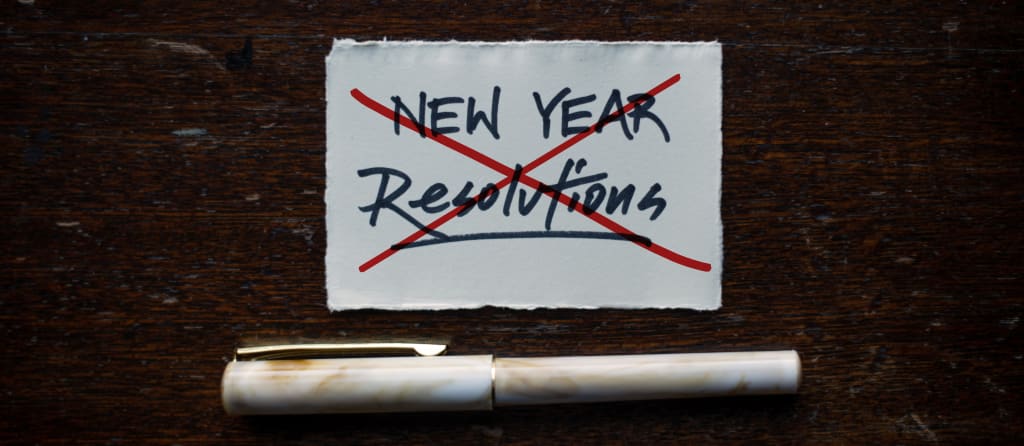
The start of a new year represents a new beginning, a fresh start, and a time for reinvention. Oftentimes we set out to change something about ourselves or our lives that we don’t like or want to improve on as resolutions in the new year. While most of these resolutions are well intended, they often don’t stick. We all know of, or perhaps even personally identify with, that person who is gung-ho on getting in shape and fit at the start of the year, hitting the gym every day in January, only to give it all up come the end of February, elbow deep in a bag of potato chips.
Why is this? Simply put: they weren’t ready to change yet. And I invite us to consider that that’s okay. This is not to say that striving to make changes in one’s life is bad or unachievable. Quite the contrary, self-improvement can be easy given the right context and can lead to incredible life transformations, but fighting yourself to get there can be exhausting and usually doesn’t work long term.
I’d like to propose a more gentle approach to resolutions, which centers around radical acceptance, examining self-talk, and changing the underlying beliefs that no longer serve us. New behaviors will then be a natural result of this more gentle approach.

Radical acceptance is the act of accepting your current circumstances without any judgments or labels. It's the mentality of “it is what it is”. Put yet another way, it’s simply the unbiased start of whatever journey of transformation you are on. People are often hesitant to accept their situation as it currently is for fear it will never change. But it’s precisely this lack of acceptance that often causes things to stay the same. As cliché as it might sound, renowned psychologist Carl Jung hit the nail on the head with the famous adage “what we resist persists”.
In many ways, New Year’s resolutions represent a battle between your old self and your new self. Acceptance is the neutral point between these two identities that are fundamentally at odds when trying to make any significant life, behavior, or identity shift. Sheer brute force implementation of new behaviors or habits to shift into the new identity bypasses acceptance which can cause a great deal of cognitive dissonance, ultimately deterring us from our goals.
Consider someone wanting to lose weight with a New Year’s resolution of going to the gym to work out regularly. Most likely the impetus for change will come from a place of negativity stemming from the belief they are overweight and unhealthy. This belief will likely stir up emotions of insecurity, fear, and distress. Going to the gym motivated by these emotions is not sustainable and is in stark contrast to the motivations of the person they are striving to become, someone who feels fit and healthy and embodies confidence, calmness, and peace. Instead of becoming the new version of themselves they are constantly at odds with the old version, probably thinking things like “I don’t think I can do this” or “I hate this” when going to the gym. On the other hand, the healthy, fit version of themselves mostly thinks “I’m up for a challenging workout” or “I enjoy moving my body”.

This difference in self-talk directly reflects the cognitive dissonance stemming from the diametrically opposed underlying beliefs. How can you ever make a lasting change in behavior without first shifting your self-talk and beliefs? Hint: It’s not possible. In the previous example, self-talk reveals how the new fit and healthy identity appreciates the process of being fit and healthy, whereas the old overweight and unhealthy identity sees working out only as a means to an end. Delving further, we can ponder the differences in underlying beliefs these two identities may have. The new fit and healthy identity probably appreciates the process because they appreciate themselves, while the old overweight and unhealthy identity doesn’t appreciate the process because deep down they don’t really appreciate themselves.
Diving even deeper, most underlying beliefs stem from either self-love or self-hatred. And as trite as that may sound, the truth is it’s not possible to transform self-hatred into self-love at the snap of a finger, so radical acceptance is the first step to gaining some middle ground in shifting between these two states. Self-talk sheds a light on where we are at psychologically and what underlying beliefs may need shifting. Often this is a cyclical process and feedback loop of radical acceptance, self-talk examination, and belief shifting until the new belief becomes dominant. New behaviors and habits will then flow naturally. It doesn’t necessarily have to take a long time but the effects will be much more fruitful than a shallow attempt at behavior and habit modification often seen when making New Year’s resolutions devoid of any self-reflection.
So for 2022, ditch the New Year’s resolutions altogether and instead give yourself the gift of gentle (but more lasting) transformation through radical acceptance, self-talk examination, and changing the underlying beliefs that no longer serve you.






Comments
There are no comments for this story
Be the first to respond and start the conversation.